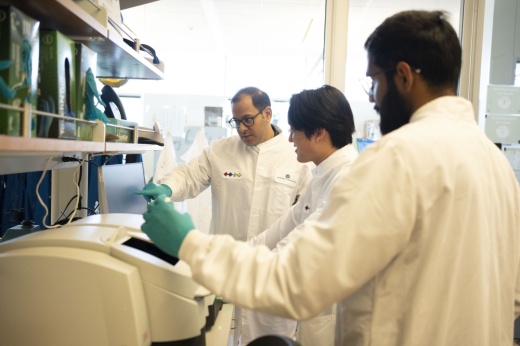Obaid said the therapy shows potential treating advanced stomach cancer and uses photodynamic therapy to kill cancer cells. The treatment could also activate the patient's immune system, potentially enhancing the effectiveness of existing treatments and reducing severe side effects associated with conventional chemotherapy.
How it works
Obaid said a lab-designed protein, called betabodies and developed at UT Southwestern are used to target cancer cells. The protein only targets cancer cells and once exposed to light, creates a toxin that kills the cells.
In addition, it is engineered to activate the immune system once the cancer cells die to "wake up" the body's natural defenses to attack any remaining cancer cells.
“These molecules behave in a way that’s similar to plants,” Obaid said. “They absorb light energy and convert it into chemical reactions.”
The therapy differs from traditional chemotherapy, which kills both health and cancerous cells, leading to significant side effects.
This light-activated therapy offers two levels of targeting: the engineered protein directs the drug specifically to cancer tissue, and the light activation ensures that the drug is only active where the light is applied. This targeted approach aims to minimize side effects compared to chemotherapy.
Measuring the impact
The therapy is in the early stage of development Obaid said and researchers are currently testing it in lab settings and on mice. It is currently funded by a $250,000 grant from the Cancer Prevention and Research Institute of Texas.
If testing is successful, Obaid said the next steps would involve applying for larger, longer-term grants to conduct more in-depth studies.
This would include further investigating the safety and efficacy of the therapy, Obaid said, potentially in additional animal models with the ultimate goal of gathering enough data to eventually move toward clinical trials in human cancer patients.
What else?
Current treatments for stomach cancer include surgery, including removing part of all of the stomach, radiation therapy, chemotherapy and immunotherapy, according to the National Cancer Institute. Treatment can vary depending on what stage of stomach cancer the patient has.
The therapy is not meant to replace existing cancer treatments such as chemotherapy and immunotherapy, Obaid said. Instead it is meant to enhance these therapies and potentially reduce doses of toxic agents and boost the body’s immune response against the cancer.
While the current research is focused on stomach cancer, Obaid said there is potential to use the treatment for other types of cancers as well, depending on the cancer’s location.





